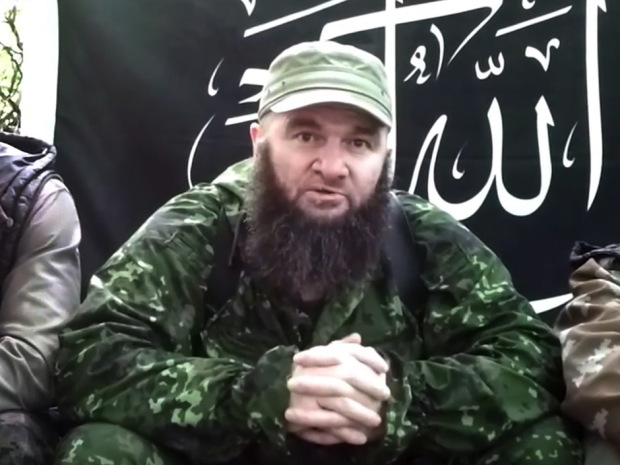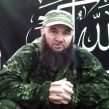
Chechens Are Being Drawn Into the Conflict in Ukraine
Publication: Eurasia Daily Monitor Volume: 11 Issue: 43
By:

Literally one month ago, this author wrote about how those opposed to the protesters in Kyiv’s Independence Square were saying that Chechens were among the protests and how the Russian side would be interested in spreading that rumor (www.jamestown.org/single/article_id=41938&no_cache=1#.UxLlQPQ4sfk). Chechen involvement in Ukraine would have given Russia an additional reason for criticizing the new Ukrainian authorities, accusing them of ties to “terrorists.” Apparently, the idea was to make use of Chechens on both sides of the dividing line.
After sending Russian troops into Crimea, Moscow did not forget about the Chechens and tried to tie the Ukrainian radical right to Chechen jihadists. On March 1, some provocateurs, writing on behalf of Dmitry Yarosh, leader of the Ukrainian organization Pravy Sektor (Right Sector), posted an appeal by Yarosh on the group’s personal page on the Russian social network Vkontakte (https://ruposters.ru/archives/3142). In the appeal, which remained on the webpage only for several hours before it was removed, Yarosh allegedly called on the peoples of the Caucasus to join forces with the Ukrainians to fight Russia. Yarosh recalled that Ukrainians had fought the Russians in the North Caucasus and that now was the time to put an end to Russia in a joint effort. “As the leader of Pravy Sektor, I call on you to ramp up your struggle,” the appeal said. “Russia is not as strong as it seems. You have really a unique chance to win. Take this chance!” The appeal was addressed to the North Caucasian separatist leader Doku Umarov, (https://www.utro.ru/articles/2014/03/01/1179235.shtml), which allowed Moscow to accuse Ukrainian radicals of an attempt to strike an alliance with a person who had officially been labeled a terrorist of global significance by the United Nations (https://www.mid.ru/brp_4.nsf/0/9DD5ED24F614D501C32578500062C247).
Ramzan Kadyrov and Yunus-Bek Yevkurov happily spread news of Yarosh’s appeal, thinking it was proof of the involvement of international terrorist gangs in Ukraine (https://www.vesti.ru/doc.html?id=1336936&cid=7). The Russian media’s eager circulation of the appeal (https://lifenews.ru/news/128197) must have forced Pravy Sektor to remove it from their account and announce that the account had been hacked. In any case, someone tried to play the Chechen card. Still, knowing the nature of Pravy Sektor and their inclination to notorious statements and actions, it can be safely assumed that Yarosh really made such an appeal.
The Russian authorities, in turn, are making use of the Chechen factor in Ukrainian affairs. In order to forestall actions by the Crimean Tatars—the only force capable of mounting resistance to Kremlin provocations on the peninsula—Russian authorities are using Ramzan Kadyrov’s contacts in this part of the Ukrainian population. The Crimean Tatars were deported from their homeland in 1944 and thus not inclined to support the Russian Federation in this conflict. Formally, the Crimean Tatars were given the right to return to the peninsula in 1974, but were allowed to do so only in 1989. The Crimean Tatars tend to blame their past travails on Russia rather than Ukraine. The Tatars’ territory was seized by ethnic Russian, not Ukrainian settlers. All of their cities, with the exception of five, were given Russian names, and they are prohibited from demanding resettlement in their former towns. Thus, the Russian Federation is certainly concerned about this part of the population of Crimea. The Crimean Tatars are not average Muslims: indeed, they are the kind of Muslims that officially call for war on Bashar al-Assad’s regime in their mosques (https://kp.ua/daily/301013/421092/).
The Islamist organization Hizb ut-Tahrir maintains a foothold in Crimea (https://www.odnako.org/blogs/integracionniy-proekt-dlya-krima-ot-hizb-ut-tahrir-i-angliyskaya-razvedka/), and adherents of Habashism, a Sufi Islamic religious movement, have also become active on the peninsula (https://www.avdet.org/node/4287). Russia is therefore unlikely to find neutral spectators of its aggressive policy in this part of Ukraine, let alone supporters, among Crimean Tatar Muslims.
Russia is earnestly hoping to obtain help from Kadyrov, who has funded construction of a mosque in Krasnoperekopsky district of Crimea that was inaugurated back in 2010 (https://www.rosbalt.ru/ukraina/2010/08/23/764575.html). Since the start of the crisis in Crimea, Kadyrov has promised to build another mosque (https://www.gazeta.ru/politics/news/2014/02/27/n_5980405.shtml), although it will be only one of 238 existing mosques (https://www.islamnews.ru/news-51071.html).
Local Chechens in Crimea present Kadyrov to the Tatars as a possible alternative power to the official authorities on the peninsula. The assumption is that Kadyrov has a close relationship with Russian President Vladimir Putin. Kadyrov’s involvement in Crimea was indicated in his remarks online. “I have personally spoken to their leaders,” he said via Instagram, commenting on Dmitry Yarosh’s appeal. “They do not intend to take up arms against Russia” (https://instagram.com/p/lAyYo8CRka/).
Moreover, in the spirit of Russia’s statements, Kadyrov stated he was prepared to dispatch forces to Crimea to protect Russians against threats from “bandits”—meaning those defending the interests of Ukraine as an independent state—and send humanitarian aid to the starving and needy (https://www.mignews.com/news/society/world/280214_210042_06446.html).
The leader of the Chechen diaspora in Ukraine, Salman Sadaev, quickly reacted to Kadyrov’s statement, asserting that nobody was threatening them or their businesses and that Chechens living in Ukraine were not commenting on or taking sides in the conflict (https://gordonua.com/news/society/CHechency-v-Ukraine-oprovergli-zayavlenie-Kadyrova-chto-ih-gnobyat-terroristy-11822.html).
At the same time, the Crimean Tatars are attempting to use this conflict to obtain more concessions from the government. If they are not heeded, they are capable of causing severe problems for the Russians for a long time. It is no secret that Crimean Tatars reportedly have been fighting in Syria against Moscow’s ally, al-Assad, for a long time (https://comments.ua/life/422882-dzhemilev-podtverdil-sirii-voyuyut.html). The exact number of Crimean Tatar fighters in Syria is hard to estimate since many of them came from among the foreign student population in Turkey.
It is obvious that whatever the future scenario in Ukraine, Chechens will be drawn into the conflict. If there is military action in Crimea, the 100,000-strong Chechen diaspora in Europe will not remain idle and will participate in the conflict—and not under the Russian flag.
Thus, having already drawn Chechens into the conflict with Ukraine, Russia risks further complicating the situation in this part of the world. Moscow will need to realize that this strategy risks making the region even worse, since it may provide the Chechens with yet another front after Syria for acting on their anti-Russian sentiment.




